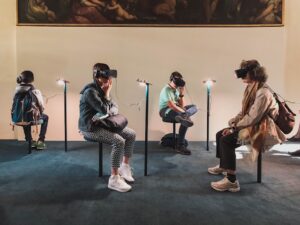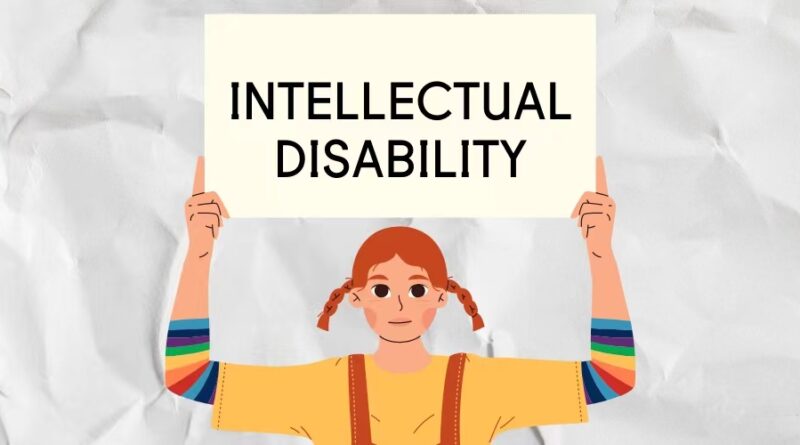Teaching Individuals with Intellectual Disabilities in China: Strategies and Challenges
Teaching Individuals with Intellectual Disabilities in China: Strategies and Challenges
Jingtian Jia and Kyrie Zhixuan Zhou
Individuals with intellectual disabilities require long-term education in specialized schools or institutions due to their unique learning needs and behavioral habits. Teachers with specialized training are essential in their education process. Based on volunteer experience at non-governmental organizations (NGOs) serving individuals with intellectual disabilities, we summarize common teaching strategies employed by teachers and challenges encountered in teaching to present the landscape of special education in China and to enlighten future LIS research.
—VR technologies can be leveraged to create simulated environments for individuals with intellectual disabilities to learn skills—
Teaching Strategies
1. Simulating Scenarios for Learning Life and Professional Skills
A primary learning need for individuals with intellectual disabilities is acquiring essential life skills such as cooking and shopping to ensure they can lead a normal life independently after their parents get older or die. Individuals with intellectual disabilities who have better cognitive abilities can complete simple professional tasks, such as washing vehicles or making handicrafts, with training. They need to learn and practice life or professional skills in different scenarios. Creating environments related to these scenarios helps them apply acquired skills outside the classroom. Further, individuals with intellectual disabilities learn skills through repetition, and thus they need the simulated environments constantly.
Recommendation 1: VR technologies can be leveraged to create simulated environments for individuals with intellectual disabilities to learn skills.
2. Art Education
 Individuals with intellectual disabilities often cannot well express their rich inner worlds through language. Therefore, artistic creation is a common way employed by teachers to help them express themselves. Allowing individuals with intellectual disabilities to learn acting, painting, and crafting for self-expression helps them be understood and appreciated.
Individuals with intellectual disabilities often cannot well express their rich inner worlds through language. Therefore, artistic creation is a common way employed by teachers to help them express themselves. Allowing individuals with intellectual disabilities to learn acting, painting, and crafting for self-expression helps them be understood and appreciated.
Recommendation 2: Developing tools to facilitate the co-creation of art between individuals with intellectual disabilities and generative AI may help them express themselves.
3. Personalized Instruction
There are significant differences in learning capabilities among individuals with intellectual disabilities. Therefore, teachers often divide students into different groups and design personalized teaching materials suitable for each group. This approach ensures that each individual with intellectual disabilities can gain knowledge and maintain confidence in learning.
Recommendation 3: ICT affordances such as Zoom breakout rooms may help with personalized instruction. For example, one teacher can manage multiple breakout rooms to deliver personalized instruction simultaneously.
4. Patience
Individuals with intellectual disabilities learn things slowly and require repetition. Compared to parents, professional teachers tend to have more patience in the teaching and learning process with due pedagogical training, but they also develop mental health issues.
Recommendation 4: Conversational AI such as ChatGPT may assist teachers in tedious tasks since AI can always be patient and adept at encouraging people.
Challenges
1. Lack of Professionalism and Communication Channels for Teachers
Many institutions and schools hire teachers who have not received systematic training in special education. Therefore, they are unable to perform effective education interventions. This, to some extent, hinders the learning of individuals with intellectual disabilities and leads to distrust from their families. Moreover, special education teachers face difficulty in finding platforms for exchanging ideas and seeking solutions.
Recommendation 5: Creating accessible learning resources for special education teachers and building platforms to connect them are important for more effective teaching.
2. Underpaid Teachers
NGOs serving individuals with intellectual disabilities often lack financial support from society and the government. They also find difficulty collecting tuition fees from students with less advantaged socioeconomic backgrounds. As a result, many organizations are unable to pay teachers’ salaries on time, despite their low salaries and excessive workload (e.g., on duty 7/24). Underpaid teachers may experience a non-ideal mental state, lose patience during the teaching process, and quit their jobs. Adapting to a new teacher is a challenging and lengthy process for individuals with intellectual disabilities, thus staff stability is important.
Recommendation 6: Without social support, online education may enable part-time teachers to work with individuals with intellectual disabilities, lower tuition fees, and make special education more accessible.
3. Need for Psychological Counseling
Individuals with intellectual disabilities may experience verbal and physical abuse from parents, school bullying, and abandonment by parents. They often lack confidence and the language skills to articulate their feelings, leading to severe psychological issues and in some cases harmful behaviors towards others, necessitating professional support in terms of psychological counseling. Teachers are also susceptible to mental health issues given the excessive workload and low salary.
Recommendation 7: Professional psychological counseling should be delivered to individuals with intellectual disabilities and special education teachers at an affordable cost and in an accessible manner.
Cite this article in APA as: Jia, J. & Zhou, K. Z. Teaching individuals with intellectual disabilities in China: Strategies and challenges. (2024, March 4). Information Matters, Vol. 4, Issue 3. https://informationmatters.org/2024/03/teaching-individuals-with-intellectual-disabilities-in-china-strategies-and-challenges/
Authors
-
Jingtian Jia is a graduate student at the University of Porto. Her research interests are related to inclusive design and special education for people with disabilities. She aspires that through inclusive design, people with disabilities can participate more equally in all aspects of society
View all posts -
Kyrie Zhixuan Zhou is a PhD candidate in the School of Information Sciences at the University of Illinois at Urbana-Champaign. His research interests are broadly in HCI and Usable Security. He aims to understand, design, and govern ICT/AI experience for vulnerable populations.
View all posts






